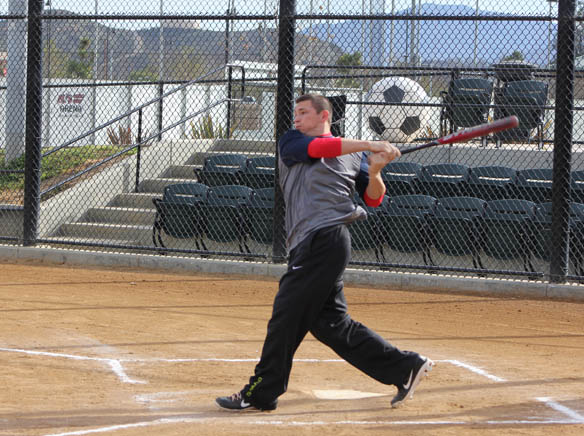If you moved into a residence located underneath the takeoff flight pattern at Lindbergh Field, then filed a lawsuit because of the noise created by both commercial and private aircraft, how would you fair in court?
That’s the dilemma facing Sportsplex USA and the City of Santee when one resident from the adjacent Stoney Brook & Canopy Park at Riverwalk housing development filed a complaint with the city because lights to the softball diamonds and arena soccer fields remain illuminated much too late.
If you moved into a residence located underneath the takeoff flight pattern at Lindbergh Field, then filed a lawsuit because of the noise created by both commercial and private aircraft, how would you fair in court?
That’s the dilemma facing Sportsplex USA and the City of Santee when one resident from the adjacent Stoney Brook & Canopy Park at Riverwalk housing development filed a complaint with the city because lights to the softball diamonds and arena soccer fields remain illuminated much too late.
According to paperwork filed with the city, the resident asked for changes and to establish a curfew.
“It’s sad to see one person file a complaint, which affects the recreation of thousands of others in such a negative manner,” said Bill Berghoff, president of Sportsplex USA, which operates the facility as a unique mixed private-public park enterprise for Santee. “So we’ve been working with the city for months in order to come up with a solution,” he added.
Typically, softball games start each hour, making for a time limit of 55 minutes per outing. However, because softball is not a timed sporting event, an inning could last indefinitely, and in some contests may run long, pushing back the schedule.
In a recent case, a player broke an ankle following a poor slide into third base. Taking time to properly care for the injured patron, paramedics needed 10-15 minutes to arrive, then another 20 minutes before being able to stabilize and then safely transport the player to the hospital. Thus, the next two games were delayed, with action ending at almost midnight.
Although this is an extreme example, on most nights events still end well after 11 p.m., which was the basis for the complaint.
Bill Maertz, the city’s director of community services, came up with an answer based on two factors indicated in section 6.9.1 of the of the agreement between the city and Sportsplex USA.
“After doing some research, it was determined there was a curfew clause in the (above listed) agreement,” said Maertz. “So even though it’s a popular sports facility, it’s also a residential neighborhood, so the 11 p.m. curfew was decided in advance,” he added.
Maertz said that the lights are now controlled by the city with a timer, which turns off the lights automatically at 11 p.m.
nightly. The concessions area may remain open until midnight however.
“We’ve tried to be responsive to the homeowner. We’ve even planted $16,000 worth of pine trees between both sites to help block the lights,” explained Maertz.
Thus, 55-minute contests were shortened to 50, although it left teams dissatisfied, with games now rarely lasting the full seven innings. Meanwhile, league fees were not correspondingly reduced for the shorter contests.
“The city has a written agreement, so they are forced to follow the rules,” admitted Berghoff. “Thus, we need to do the same thing,” he added.
However, written rules, whether legal or not, apparently are not being followed by the above mentioned resident (whose name was not officially released by the city to avoid possible verbal or physical abuse). According to the Riverwalk home owners association, all residents signed a document making it known in advance that Sportsplex USA hosts events, which could lead to an increase of noise, traffic and late hours.
“We even printed the disclosure on a pink piece of paper so it would stand out and everyone would notice it when they made a home purchase and signed the documents,” said Dean Velasco, a Riverwalk HOA board member. “Plus, the residents which were upset and filed their grievance didn’t purchase their unit until after the opening of Sportsplex USA, and it was already there,” he added.
Thus, the airport argument is that it is it hypocritical to complain after being given (what Sportsplex USA considers to be) advance legal notice.
As supplied by the HOA, the city even made it mandatory for Standard Pacific Homes, the developer, to make sure each new homeowner signed at least two documents noting plans for the surrounding community.
The “City of Santee Required Purchaser Disclosures” specifically mentions Town Center Community Park, a 55-acre public park, which “consists of lighted ballparks, a skate park, numerous soccer fields, pools, parking lots, and a YMCA facility. It indicates that lighting from the park will be visible from the Community. In addition, the Community will be subject to increased noise, traffic and other nuisances associated with a large public park.”
An additional “Disclosure Addendum” also directly comments on the sports complex, among other issues. Yet the section on the Sportsplex USA facility is the lone part of the document in all capital letters to ensure notice to home-buyers and is part of the escrow process.














